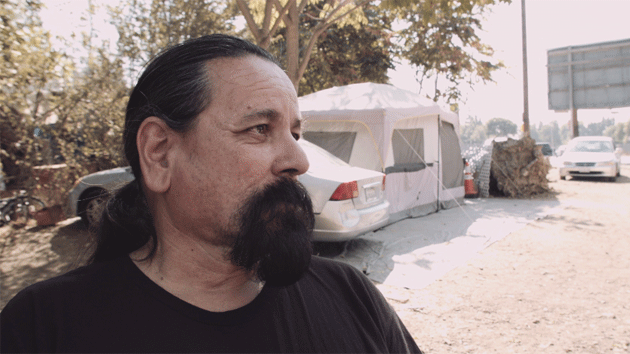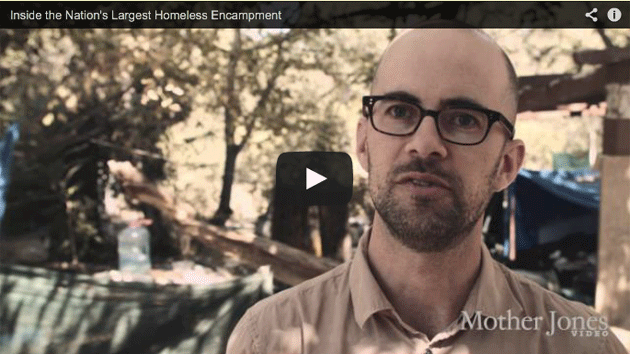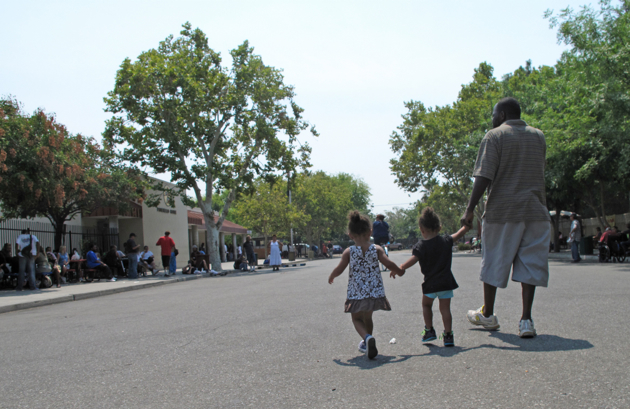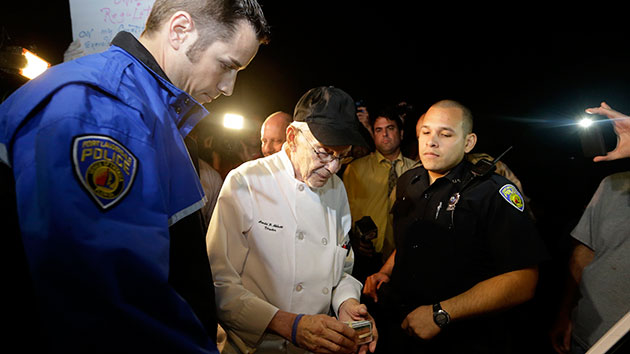
Robert Aguirre and his wife live at the Jungle, a San Jose homeless encampment.Prashanth Kamalakamthan
In October I visited what’s believed to be the nation’s largest homeless encampment, a tent city along a stretch of creek smack in the middle of Silicon Valley. A local preacher there introduced me to Robert Aguirre, a 60-year-old electrical engineer who had an incredible story to tell about going from being the owner of a successful tech firm to being homeless. Although I couldn’t independently verify everything he told me, I determined that many details were definitely true. Here’s his story in his own words, edited for length and clarity:
For many years, I had my own engineering consultancy in Silicon Valley. I helped get a lot of products approved under FCC and UL standards for companies such as 3Com, Dell, Microsoft, and Cisco—until all the manufacturers decided to move out of the country. I was offered a position in China. I’ve been there, and quite frankly I don’t want to live there. That’s why a lot of people are out of jobs. The jobs that do remain are very technical and usually they hire people right out of school or while they’re still in school. Old farts like me don’t have a chance of competing. I lost my business and the house I owned. When the economy took a dump it took me with it.
My wife is a medical clerk who makes about $3,000 a month. She’s handicapped and couldn’t take it going up and down the stairs in the apartment we were renting in San Jose, so we ended up finding another place. We gave our notice, and then as the day approached for us to move into our new place, that landlord told us he’d decided to rent out to relatives and we couldn’t move in. So then we went back to the first landlord and she said, “Sorry, I already rented it out.” So we had to put everything into storage and we started living in the car, trying to find apartments.
We’d been paying $1,750 a month, which is about as cheap as rent comes here unless you want to live in a roach motel. We were looking for places in that same price range, but all the rents had gone up and the cheapest ones we could find were around $1,900. The other problem was when you go and apply at a lot of different places it creates a hit on your credit, and eventually you don’t qualify because your credit score gets so low. They told us it would take about a year to recover from that. We’re really not making enough money to afford conventional housing, yet we make too much money for subsidized homes. So we’re kind of floating between the oil and water somewhere in there.
After sleeping in the car for about two months, my wife’s legs and feet were swelling up. The doctor said she had edema as a result of not being able to have her feet elevated. That’s a very common malady for people who sleep in their car, who don’t get a chance to really stretch out. So her doctor recommended we get a tent. All the campgrounds were too far out of the city, so we decided to move into the Jungle.
The Jungle is a forested stretch of Coyote Creek where about 300 people live in tents and shanties. They use the creek as a latrine or to bathe in; they just don’t drink from it. I’ve heard that the Jungle is the largest encampment of homeless individuals in the United States. The city doesn’t refer to it as the Jungle, which kind of connotes wild animals or wild behavior. It’s actually really close to lots of tech campuses. Every day, a Yahoo bus goes by.
I’ve been in San Jose for about 40 years. The majority of people in the Jungle are from San Jose. They were born here, they were raised here, they saw what this land was like before it became this. And they talk about it. They say, “Oh man, you should have seen what it was like.”
People are down in the Jungle for all sorts of different reasons—domestic violence, mental health problems, drug problems, or just being broke. I’d easily say 75 percent of people in the Jungle wouldn’t be there if they could afford housing. The community here is organized into three or four different supergroups who have compounds that operate kind of like medieval castles. It’s the same idea as gangs in any other neighborhood; as long as you don’t choose sides or try to get yourself involved you’re pretty safe. But a few weeks ago, there was a woman here who was badmouthing people. She’d also just received a very large sum of money from her mother. Some people decided they needed it more than she did and ended up slitting her throat and severing her jugular. When she continued fighting, someone else came up behind her and hit her in the head with an axe. The police didn’t want to go down there without backup, so one of the residents carried her out. I heard that she died in the hospital.
Our tent, which we pitched up top near the road, is much larger than those of other people around here. We have iPhones and a wireless hotspot. I even had solar panels at one point before they got stolen. We’re in a different category from most of the other people here, though we’re far from the only ones who are gainfully employed and trying to do things for themselves but just can’t afford a place.
Over time I’ve acquired five trash cans, and every night and morning I go out and pick up trash. I go to all the city hall meetings, the housing meetings, the county supervisors meetings to advocate for homeless people. We are trying to get this place cleaned up and to get people taken out of here as safely and quickly as possible and trying not to abandon anyone.
In September, the authorities announced plans to shut down the Jungle by December while giving everyone a place to live. My wife and I received housing voucher about four months ago, but so far it hasn’t been a vehicle for us getting housing any quicker. The problem is that a lot of landlords don’t want to deal with vouchers. They’d rather not divulge how much money they’re making on their apartments. The other thing is that there’s a certain stigma associated with homeless people. If they ask for your previous address you have nothing to tell them. “Oh, well, I live in the Jungle.” That’s unacceptable.
I’m among the lucky ones, though. There’s only 200 housing vouchers; as quickly as they house people, others come in to fill the void. So we’re trying to look at something that can house the 4,000 or 5,000 people who are homeless in Santa Clara County. I think the tech companies have an obligation to help out; they’re the ones who’ve outsourced middle-class jobs and driven rents and property values far beyond many people’s reach. Society is judged by how we treat those that are unable to care for themselves—the elderly, the young, and the mentally disabled. That’s the real measure of who we are.
Watch this video about life in the Jungle:















